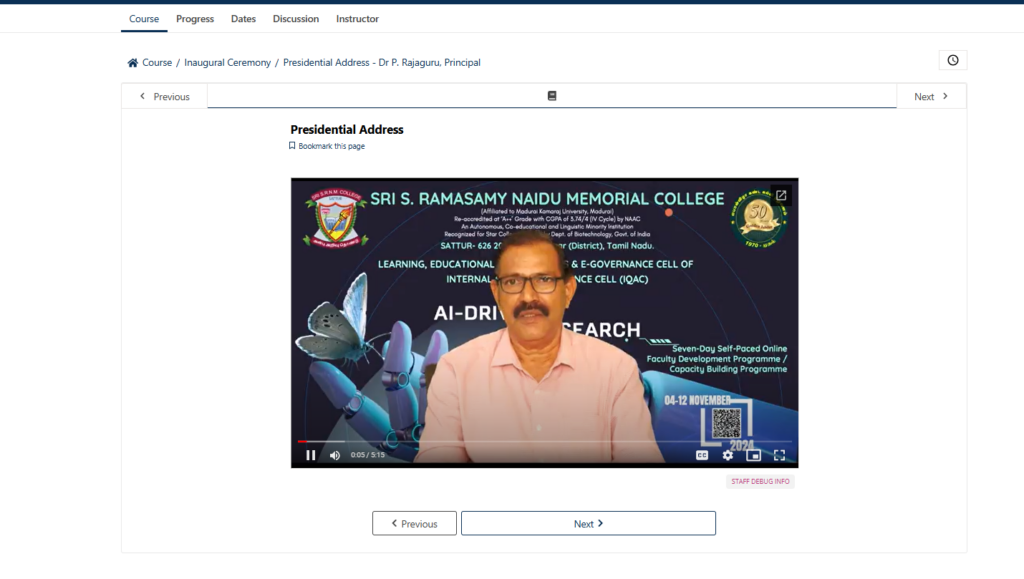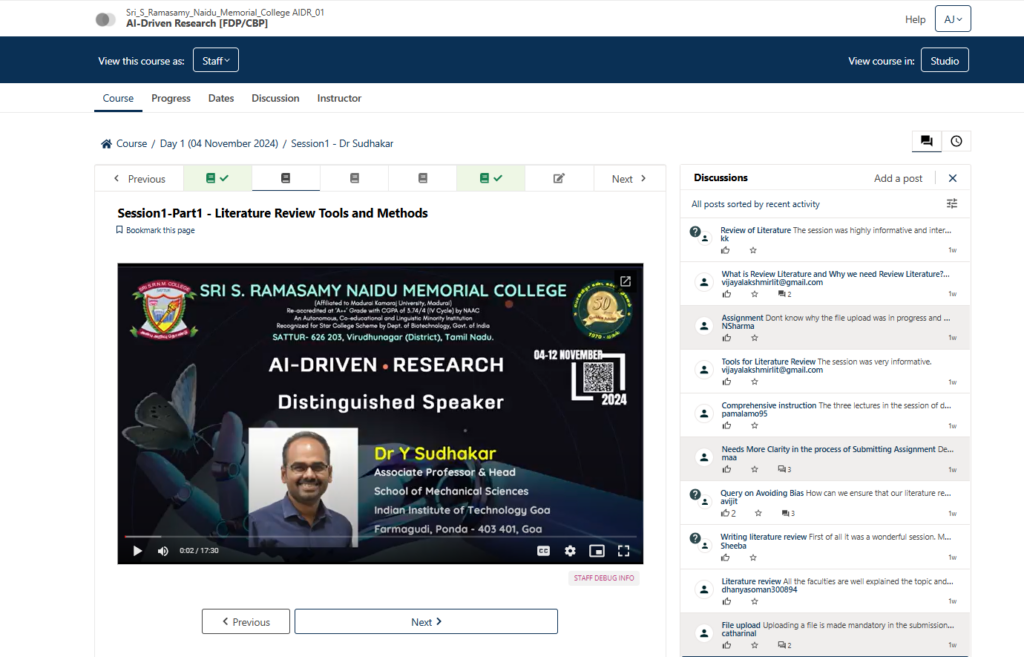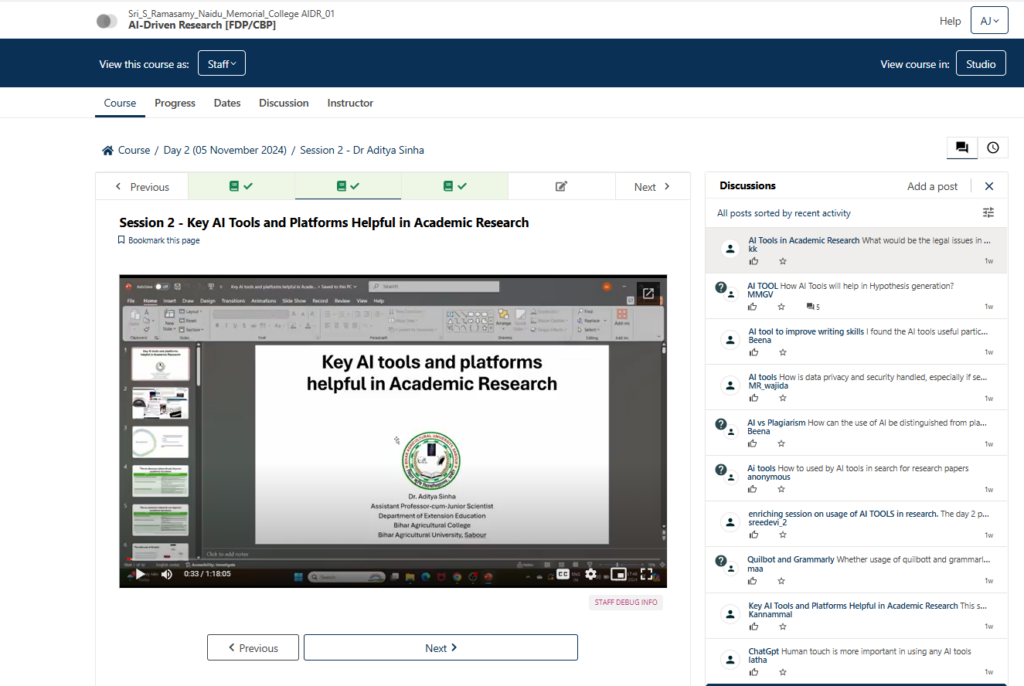The Learning, Educational Technologies and E-Governance Cell, in association with the Internal Quality Assurance Cell (IQAC) of Sri S. Ramasamy Naidu Memorial College, Sattur, organised a seven-day self-paced online Faculty Development Programme cum Capacity Building Programme on “AI-Driven Research Excellence” from 4th November to 11th November 2024. This programme aimed to enhance the research capabilities of faculty members and scholars by equipping them with knowledge and tools to leverage Artificial Intelligence (AI) in academic research. Participants from across India, representing diverse institutions and regions, attended the programme, making it a truly national-level initiative.

The inaugural session was graced by Dr. P. Rajaguru, Principal of Sri SRNM College, who delivered the Presidential Address, emphasising the significance of integrating AI in academia. Dr. A. Rajeshkanna, IQAC Coordinator, welcomed the participants, while Lt. Dr. B. Ajantha, Dean of Internal Affairs and Extension Activities, provided a detailed introduction to the programme’s objectives and expected outcomes. Dr. K. Saravanakumar, Dean of Learning, Educational Technologies and E-Governance Cell, briefed the participants on the technical aspects of the programme. The programme concluded with a Vote of Thanks proposed by Mr. S. Venkatesh, Assistant Professor of Chemistry.
The programme featured insightful sessions delivered by distinguished experts from premier institutions. Dr. Y. Sudhakar, Associate Professor and Head, School of Mechanical Sciences, IIT Goa, presented a session on “Literature Review Tools and Methods.” His talk provided participants with a clear understanding of the significance of literature reviews in research and practical guidance on tools like Connected Papers and Zotero for effective reference management. The session was highly appreciated for its comprehensive approach to research methodologies and the use of advanced tools for analysing academic papers.


Dr. Aditya Sinha, Assistant Professor, Department of Extension Education, Bihar Agricultural University, Sabour
Bihar delivered an engaging lecture on “Key AI Tools and Platforms for Academic Research,” shedding light on the transformative potential of AI in academia. His discussion spanned six key domains where AI can enhance academic functions, ethical considerations in AI application, and essential guidelines for responsible usage. The practical demonstrations of tools like Consensus, ResearchRabbit, Scite, and Elicit were particularly valuable, equipping participants with the knowledge to implement AI effectively in their research processes.
The session by Dr. Xavier Pradheep Singh, Assistant Professor of English, St. Joseph’s College (Autonomous)
Tiruchirapalli on “Literature Review and Knowledge Extraction with AI” offered extensive insights into utilising AI for efficient literature reviews. He emphasised crafting effective prompts and provided hands-on demonstrations of AI tools such as Perplexity, Semantic Scholar, Scholarcy, and ResearchBuddy. This session was particularly praised for its focus on simplifying complex tasks in academic research using AI-powered tools.
Dr. Varun Bhaskar, Assistant Professor, Molecular Biology and Genetics Unit, Jawaharlal Nehru Centre for Advanced Scientific Research, Bangalore presented a remarkable session on “Image Processing and AI,” exploring the applications of AI in image processing, particularly in noise reduction and image segmentation. He provided practical demonstrations of deep learning methods, highlighting their potential in enhancing image quality. His discussion on the ethical implications of AI in image processing added a critical dimension to the session, encouraging participants to consider the broader consequences of their research.
The session on “Case Studies in AI Research” by Dr. Kannan Prasad, Assistant Professor, Department of English, Loyola College (Autonomous), Chennai offered an in-depth exploration of AI’s real-world applications. He discussed case studies, including AI in drug discovery, highlighting its ability to analyse vast datasets for identifying potential drug candidates. The session also addressed AI’s role in political strategising through volumetric analysis and dynamic data interaction, with a particular focus on the importance of data visualisation in research. His ability to combine technical depth with practical examples made the session both engaging and informative.
Dr. V. Anbarasu, Associate Professor & Head, Department of Physics, PSG College of Arts and Science
Coimbatore delivered a comprehensive presentation on “Navigating IPR in the Age of AI,” he elucidated various types of Intellectual Property Rights (IPR) in India, including patents, trademarks, geographical indications, and trade secrets. His step-by-step guidance on patent filing and trademark registration provided participants with practical insights into the IPR landscape, making the session particularly beneficial for researchers looking to protect their innovations.
The seventh day of the programme marked a unique and innovative milestone, as the session was entirely designed, curated, and conducted by AI tools. The session showcased the potential of AI in not only assisting academic research but also autonomously delivering educational content. This groundbreaking approach provided participants with a firsthand experience of the capabilities of AI-driven systems in academia.The session commenced with an introduction generated by AI, setting the context for how artificial intelligence can transform traditional research methodologies. Participants expressed amazement at the seamless flow of the session and the depth of insights offered by the AI tools. The novelty of having a session led by AI not only underscored the evolving role of technology in education but also inspired participants to explore creative applications of AI in their own fields. This final session encapsulated the programme’s theme of “AI-Driven Research Excellence,” leaving participants with a deeper understanding of AI’s transformative potential. It was a fitting conclusion to a week of rigorous learning and exploration, cementing AI’s role as a co-creator in the academic realm.
The programme stood out for its emphasis on participant engagement, featuring daily assignments designed to encourage the application of concepts covered in the sessions. A grand assignment on the final day allowed participants to showcase their understanding of AI tools in research. Outstanding contributions were recognised with awards, including a Distinguished Participant Award for one faculty member and one research scholar, with a cash prize of ₹1000 each, and Certificates of Excellence for four faculty members and four research scholars, along with reimbursement of their registration fees.
The programme’s success was further amplified by the diverse geographical representation of its participants. It fills us with immense pride to note that we had attendees joining us from across the length and breadth of India, bringing a wide array of perspectives and enriching the discussions. Participants hailed from the eastern states of West Bengal and Odisha, the western regions of Gujarat and Maharashtra, the northern territories of Punjab and Delhi, and the southern states of Tamil Nadu and Kerala. Central India, including Madhya Pradesh, was also well represented, showcasing the nationwide reach of the programme.
The notable presence of participants from Pune, recognised as a leading tech hub, added a specialised dimension to the interactions, blending academic and technological insights. The programme achieved international reach with the participation of a scholar from Uzbekistan, elevating its status to a global platform for academic dialogue.
This broad geographical and cultural diversity contributed significantly to the depth and richness of the discussions, allowing for varied perspectives and experiences to converge in meaningful ways. The participants’ active engagement, thoughtful questions, and collaborative spirit were instrumental in making this Faculty Development Programme a resounding success. We extend our heartfelt gratitude to all participants for their enthusiasm and valuable contributions, which were pivotal in shaping the programme into a truly national and international event.
The event received overwhelmingly positive feedback from participants, who lauded the practical demonstrations, expert insights, and the programme’s innovative approach to integrating AI in academia. We also received some video feedback from participants, which served as a testament to the programme’s impact. These videos capture the participants’ reflections on the sessions, their appreciation for the expert-led insights, and their enthusiasm for the practical applications of AI in research. These feedbacks provide valuable perspectives and affirm the programme’s success in delivering a meaningful and transformative learning experience.
The Seven-Day Self-Paced Online Faculty Development Programme cum Capacity Building Programme was a resounding success, bringing together diverse perspectives and expertise to explore the transformative potential of AI in academic research. The knowledge imparted during the sessions and the skills developed through assignments have left a lasting impact on participants, empowering them to pursue research excellence with AI-driven methodologies.

